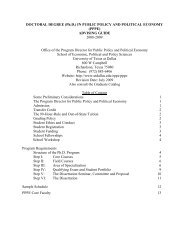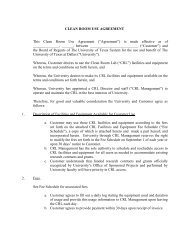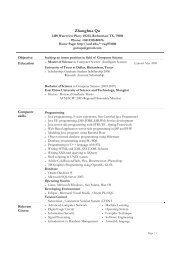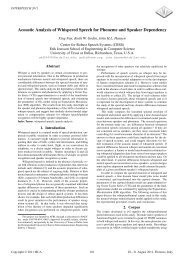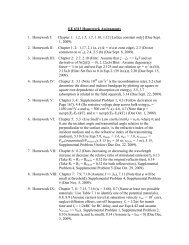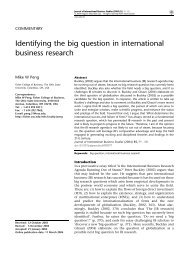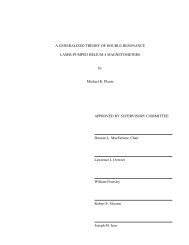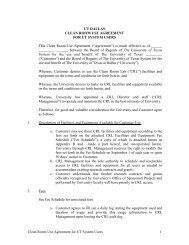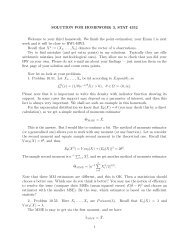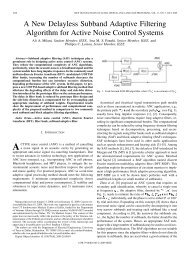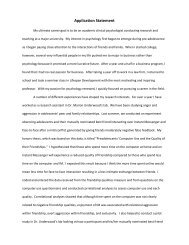Behind Intermediary Performance in Export Trade - The University of ...
Behind Intermediary Performance in Export Trade - The University of ...
Behind Intermediary Performance in Export Trade - The University of ...
You also want an ePaper? Increase the reach of your titles
YUMPU automatically turns print PDFs into web optimized ePapers that Google loves.
INTERMEDIARY PERFORMANCE IN EXPORT TRADE<br />
<strong>in</strong>g <strong>in</strong>to overseas markets and experienced<br />
exporters (<strong>in</strong>clud<strong>in</strong>g mult<strong>in</strong>ational<br />
corporations) <strong>in</strong> enter<strong>in</strong>g unfamiliar<br />
countries. <strong>The</strong>y are def<strong>in</strong>ed as<br />
“specialist firms that function as export<br />
departments <strong>of</strong> several manufacturers <strong>in</strong><br />
noncompetitive l<strong>in</strong>es” (Root, 1994, p.<br />
102). Although an emerg<strong>in</strong>g body <strong>of</strong> research<br />
suggests that <strong>in</strong>termediaries may<br />
impact the performance <strong>of</strong> exporters by<br />
enabl<strong>in</strong>g the latter to reach a wider range<br />
<strong>of</strong> foreign markets (Il<strong>in</strong>itch, Peng, East<strong>in</strong>,<br />
and Paun, 1994), the literature has<br />
largely focused on firms that export their<br />
own products. As a result, a more rigorous<br />
understand<strong>in</strong>g <strong>of</strong> the determ<strong>in</strong>ants<br />
<strong>of</strong> export <strong>in</strong>termediary performance<br />
could provide one <strong>of</strong> the critical “miss<strong>in</strong>g<br />
l<strong>in</strong>ks” <strong>in</strong> exist<strong>in</strong>g research (Peng and<br />
Il<strong>in</strong>itch, 1998, p. 609). 1<br />
In an earlier article published <strong>in</strong> this<br />
Journal, we argued that a better understand<strong>in</strong>g<br />
<strong>of</strong> what is beh<strong>in</strong>d export <strong>in</strong>termediary<br />
performance may benefit researchers,<br />
practitioners, and policymakers<br />
(Peng and Il<strong>in</strong>itch, 1998, pp. 617-8).<br />
First, researchers may f<strong>in</strong>d such knowledge<br />
helpful <strong>in</strong> address<strong>in</strong>g unanswered<br />
questions, such as why the l<strong>in</strong>ear, stagelike<br />
progression <strong>in</strong> <strong>in</strong>ternationalization,<br />
widely portrayed <strong>in</strong> the literature, “may<br />
not always occur” (Leonidou and Katsikeas,<br />
1996, p. 541). Focus<strong>in</strong>g on export<br />
<strong>in</strong>termediaries may help solve this puzzle<br />
because <strong>in</strong>termediaries may facilitate<br />
a “quantum leap” <strong>in</strong> export <strong>in</strong>volvement<br />
for some manufacturers (Il<strong>in</strong>itch, et al.,<br />
1994). At the same time, some <strong>in</strong>termediaries<br />
may have the <strong>in</strong>centive to <strong>in</strong>hibit<br />
manufacturers’ advancement along the<br />
export development path <strong>in</strong> order to preserve<br />
<strong>in</strong>termediation pr<strong>of</strong>its. However,<br />
aggressively practic<strong>in</strong>g this strategy may<br />
backfire, because it may scare away exist<strong>in</strong>g<br />
and potential clients. <strong>The</strong>refore,<br />
how <strong>in</strong>termediaries can enhance their<br />
own performance without alienat<strong>in</strong>g<br />
their clients rema<strong>in</strong>s an important but<br />
unexplored question. Second, for export<br />
<strong>in</strong>termediary practitioners, know<strong>in</strong>g<br />
what works and what does not enables<br />
them to craft better strategies. Such<br />
knowledge may also help their client<br />
firms to make more <strong>in</strong>formed channel<br />
choice decisions. F<strong>in</strong>ally, know<strong>in</strong>g the<br />
determ<strong>in</strong>ants <strong>of</strong> export <strong>in</strong>termediary performance<br />
may help policymakers enhance<br />
the effectiveness <strong>of</strong> government<br />
export promotion efforts. For example,<br />
the <strong>Export</strong> Trad<strong>in</strong>g Company Act <strong>of</strong><br />
1982, much-heralded as a stimulant for<br />
more U.S. exports but widely regarded as<br />
a failure <strong>in</strong> practice, might have been<br />
more successful had more solid knowledge<br />
on export <strong>in</strong>termediary performance<br />
been available (Peng, 1998).<br />
Motivated by these scholarly, practical,<br />
and policy considerations, the<br />
present article extends the earlier work<br />
<strong>of</strong> Peng and Il<strong>in</strong>itch (1998) by undertak<strong>in</strong>g<br />
the first efforts to empirically explore<br />
the performance determ<strong>in</strong>ants <strong>of</strong> <strong>in</strong>termediary<br />
firms <strong>in</strong> export trade. We accomplish<br />
this by draw<strong>in</strong>g on transaction<br />
cost, agency, and resource-based theories.<br />
We suggest that, given the transaction<br />
cost constra<strong>in</strong>ts and the pr<strong>in</strong>cipalagent<br />
conflicts, export <strong>in</strong>termediaries’<br />
performance depends on their possession<br />
<strong>of</strong> valuable, unique, and hard-toimitate<br />
resources which help m<strong>in</strong>imize<br />
their clients’ transaction and agency<br />
costs. Our empirical efforts center on the<br />
identification <strong>of</strong> the extent to which<br />
these resources are beneficial.<br />
EXPORT INTERMEDIARIES<br />
Intermediaries perform an important<br />
“middleman” function by l<strong>in</strong>k<strong>in</strong>g <strong>in</strong>dividuals<br />
and organizations that otherwise<br />
would not have been connected. Many<br />
smaller firms are <strong>in</strong>timidated by the<br />
328 JOURNAL OF INTERNATIONAL BUSINESS STUDIES



